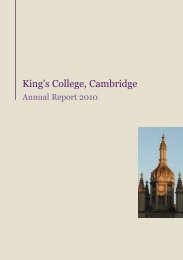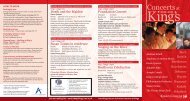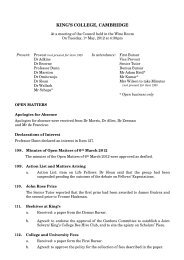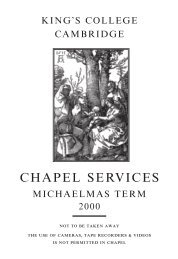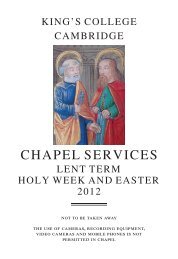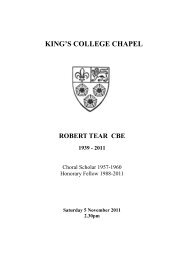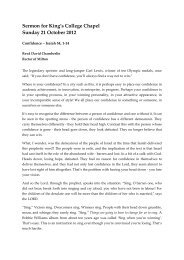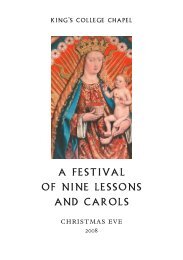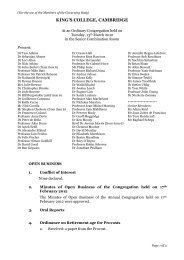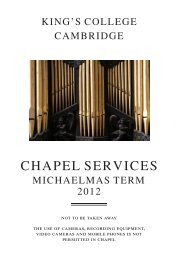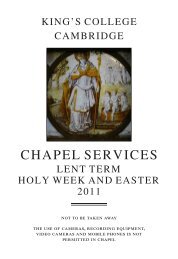Part 2 (Obituaries) - King's College - University of Cambridge
Part 2 (Obituaries) - King's College - University of Cambridge
Part 2 (Obituaries) - King's College - University of Cambridge
Create successful ePaper yourself
Turn your PDF publications into a flip-book with our unique Google optimized e-Paper software.
Peter returned to England and to <strong>Cambridge</strong> in 1991 as an Assistant Lecturer<br />
in the Department <strong>of</strong> History and Philosophy <strong>of</strong> Science. He joined a<br />
Department which was divided to the point <strong>of</strong> dysfunction. Not only did he<br />
rise to be Head <strong>of</strong> Department (1996) and Pr<strong>of</strong>essor (1997) with<br />
extraordinary rapidity, but he also turned the Department with similar speed<br />
into one <strong>of</strong> the best run and most intellectually stimulating in the <strong>University</strong><br />
– and world-renowned.To the amazement <strong>of</strong> other arguing departments, he<br />
successfully held faculty retreats every year – a whole day at his house,<br />
compulsory for all academic staff; set up reading groups; insisted on<br />
properly organised and run meetings; insisted on a decent espresso<br />
machine; employed fine staff from secretary to lecturer and nourished the<br />
abilities <strong>of</strong> all <strong>of</strong> them. He led by example, in his teaching and care, and led<br />
too in fundraising, administrative order and intellectual standards. He<br />
managed to be a dominant leader and to promote the Department in<br />
competition with others in the <strong>University</strong> without alienating or appearing<br />
Machiavellian. There was no trickiness here: Peter was patently honest,<br />
hardworking and seeking after the best, however much Cornford’s theory <strong>of</strong><br />
<strong>University</strong> politics would dismiss such behaviour as destined to fail. When<br />
Peter died, the Department was stricken. His <strong>of</strong>fice was left untouched for<br />
months, as no one could bear to go in.<br />
Peter’s own work focused on science and epistemology. His book Inference to<br />
the Best Explanation (1991; 2nd edition 2004) is a now-standard work on how<br />
we try to explain things by making inferences from evidence. He was also<br />
fascinated by medical ethics. He chaired a working party on ethical issues <strong>of</strong><br />
pharmacogenetics as a member <strong>of</strong> the Nuffield Council on Bioethics, and<br />
was a Fellow <strong>of</strong> the Academy <strong>of</strong> Medical Sciences. In 2004, he was the<br />
Medawar Prize Lecturer at the Royal Society. Peter worked, that is, at the<br />
highest level <strong>of</strong> philosophy, and developed its engagement with medicine<br />
and public life.<br />
But what made Peter remarkable was his ability to bring his work to a wide<br />
audience. Typically, he gave his inaugural lecture as part <strong>of</strong> Science Week. He<br />
enthralled a packed audience in Lady Mitchell Hall, speaking without a note,<br />
and starting with the announcement that his lecture was designed to be<br />
65<br />
OBITUARIES



